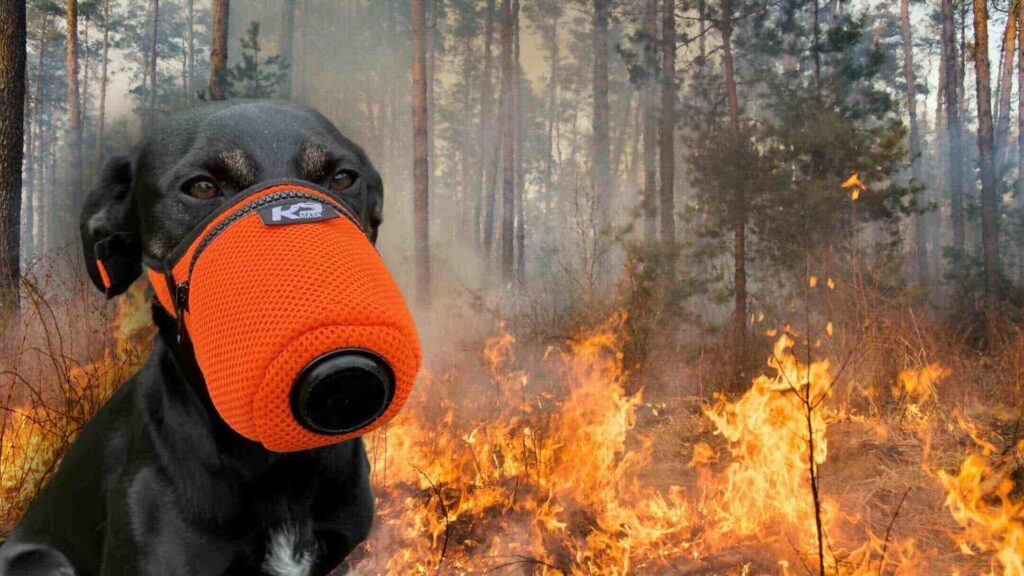Wildfires are becoming increasingly common, and while we often think about how these natural disasters impact humans, it’s equally important to consider the safety of our pets. Wildfire smoke contains harmful particles that can affect your furry friends just as much, if not more, than they affect you. From respiratory issues to eye irritation, pets can face numerous health risks if not properly protected. Here’s a comprehensive guide to help you keep your pets safe during wildfire season.
Table of Contents
ToggleUnderstand the Risks

Wildfire smoke contains fine particles, carbon monoxide, and other toxic chemicals that can irritate the respiratory system. Pets are particularly vulnerable because:
- Smaller lungs: Their smaller respiratory systems mean they can be affected more quickly by pollutants.
- Closer to the ground: Pets like dogs and cats breathe in air closer to the ground, where smoke particles can settle.
- Inability to communicate symptoms: Unlike humans, pets can’t tell us when they’re feeling unwell.
Common symptoms of smoke exposure in pets include:
- Coughing or gagging
- Difficulty breathing
- Red or watery eyes
- Fatigue or lethargy
- Loss of appetite
If you notice any of these symptoms, it’s important to consult a veterinarian immediately.
Steps to Protect Your Pets

1. Keep Them Indoors
The best way to protect your pets from wildfire smoke is to keep them indoors. Close all windows, doors, and any vents that might let in smoky air. Use air purifiers if possible to maintain good indoor air quality.
2. Limit Outdoor Time
If your pets need to go outside for bathroom breaks, try to limit their time outdoors. Keep these trips as brief as possible and monitor their behavior closely.
3. Create a Safe Indoor Space
Designate a specific area in your home as a “clean air room” for your pets. Use HEPA air purifiers to reduce airborne particles. Avoid using candles or fireplaces, as they can contribute to indoor air pollution.
4. Use Pet-Safe Masks
While not all pets will tolerate masks, there are pet-specific masks available for dogs. These can provide some level of protection if your pet needs to be outdoors for an extended period.
5. Monitor Air Quality
Check local air quality indexes (AQI) regularly. If the AQI is above 150 (unhealthy), it’s critical to keep your pets indoors as much as possible. Websites like AirNow.gov or apps like AQI Monitor can provide real-time updates.
6. Keep Them Hydrated
Smoke exposure can dry out mucous membranes. Make sure your pets have access to plenty of fresh, clean water to stay hydrated and help flush out toxins.
7. Grooming and Cleaning
After brief outdoor exposure, wipe your pet’s fur, paws, and nose with a damp cloth to remove any settled particles. Avoid over-bathing, as it can strip their skin of natural oils.
8. Have an Evacuation Plan
In case you need to evacuate, have a pet emergency kit ready. Include essentials like food, water, medications, a leash, carrier, and a copy of your pet’s medical records. Practice evacuation drills so you and your pets are prepared.
When to Seek Veterinary Care

If you notice any of the following signs, contact your veterinarian immediately:
- Persistent coughing or difficulty breathing
- Excessive fatigue or inability to move
- Pale or blue gums
- Vomiting or loss of appetite
Early intervention can make a significant difference in your pet’s recovery.
FAQs About Pets and Wildfire Smoke
Q: Can wildfire smoke harm all types of pets?
A: Yes, wildfire smoke can affect all pets, including dogs, cats, birds, rabbits, and even reptiles. Each species has unique vulnerabilities, so it’s essential to tailor your precautions accordingly.
Q: How do I know if my pet is experiencing smoke-related issues?
A: Watch for symptoms like coughing, difficulty breathing, red or watery eyes, lethargy, and loss of appetite. If you’re unsure, consult your vet.
Q: Are there specific breeds more sensitive to smoke?
A: Yes, brachycephalic breeds (like Bulldogs, Pugs, and Persian cats) with shorter snouts are more prone to respiratory issues and may require extra care.
Q: Can I use essential oils to help my pet during wildfire season?
A: Be cautious with essential oils, as some can be toxic to pets. Always consult your veterinarian before using any alternative treatments.
Q: What’s the best way to monitor air quality for my pet’s safety?
A: Use reliable sources like AirNow.gov or air quality monitoring apps. Look for indoor air purifiers with AQI displays for real-time updates inside your home.
Final Thoughts
Keeping your pets safe during wildfire season requires a combination of preparedness, vigilance, and care. By creating a safe indoor environment, monitoring their health, and having an emergency plan, you can help ensure your furry friends stay healthy and happy even during challenging times. Remember, your pets rely on you for their safety, so take proactive steps to protect them from the dangers of wildfire smoke.














